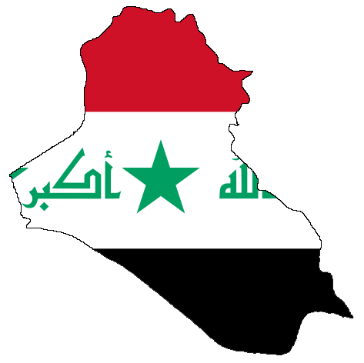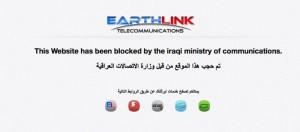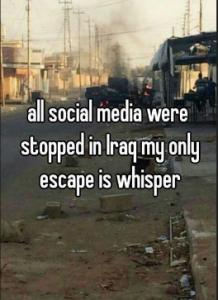
Iraqi Censorship: Social Media Blocked Unless You Whisper
In an attempt to prevent communication and thus hinder the mobilization of the Islamist State of Iraq and Syria (ISIS), the Iraqi government restricted access to numerous social media sites as early as June 13th, including Facebook, Twitter, YouTube, WhatsApp, and Viber. Some journalists have also reported that the Internet has been “getting progressively slower.” Such attempts at internet censorship, as well as methods used to circumvent these restrictions, are outlined in a briefing report published by Madeline Bersch and American Security Project Fellow Matthew Wallin entitled Internet Censorship and Circumvention.
In recent history, attempts at internet censorship in this region have been met with strong criticism from Western media and activists, yet these authoritarian regulations in Iraq are being largely overlooked. Because of the violence that these censorship efforts are allegedly trying to prevent, is such an extreme response justified? Although ISIS has been known to use such social media platforms for recruitment and propaganda efforts, social media and the instantaneous information that it can provide is greatly beneficial for the Iraqi citizens in affected areas as well as the hundreds of thousands who have fled to seek refuge.
In addition, these Internet regulations are proving ineffective at containing ISIS and are thus restricting the general population unnecessarily. Because ISIS developed in the remote deserts of the region and is fairly well organized, it has the capabilities to use alternative technologies such as VPN, satellite communications, proxy servers, or even direct fiber-optic lines to exterior providers in order to gain internet access and thus bypass censorship. In fact, Internet traffic trends indicate “significant declines in access in social media services in Baghdad and the immediate vicinity,” but “Internet access in other parts of the country were disrupted to a lesser extent, if at all.” Psiphon, a system designed for circumventing internet censorship, averages approximately 8,000 Iraqi users a day, but reported over 550,000 on the Sunday following the censors, according to BBC.
 One social media outlet has survived the censorship; a sharing application called Whisper. Iraqi youth have been using this app primarily as a means to anonymously vent their frustrations, much like adolescents in other places around the world. However, Whisper has the potential to emerge as more than just a confessional and could be utilized by the Iraqi population to quickly spread important news or warnings. For example, the U.S. Embassy in Iraq relocated a number of its staff as a precautionary measure this past Saturday (6/14). At 8AM that day, the following Whisper was created and shared publicly: “U.S. Embassy in Baghdad is evacuating!!! Yeppp!!!!” Although this turned out to be an exaggeration, this story was not covered until hours later by the media. In addition, CNNMoney reported that, according to Whisper’s editor-in-chief Neetzan Zimmerman, “usage in Iraq more than doubled between June 12 and June 15.” Whisper’s user interface is also somewhat unique in allowing searches not only by category/theme but also by location. Therefore, if its user base continues to increase, it may become a potentially viable avenue for mass communication amidst censorship.
One social media outlet has survived the censorship; a sharing application called Whisper. Iraqi youth have been using this app primarily as a means to anonymously vent their frustrations, much like adolescents in other places around the world. However, Whisper has the potential to emerge as more than just a confessional and could be utilized by the Iraqi population to quickly spread important news or warnings. For example, the U.S. Embassy in Iraq relocated a number of its staff as a precautionary measure this past Saturday (6/14). At 8AM that day, the following Whisper was created and shared publicly: “U.S. Embassy in Baghdad is evacuating!!! Yeppp!!!!” Although this turned out to be an exaggeration, this story was not covered until hours later by the media. In addition, CNNMoney reported that, according to Whisper’s editor-in-chief Neetzan Zimmerman, “usage in Iraq more than doubled between June 12 and June 15.” Whisper’s user interface is also somewhat unique in allowing searches not only by category/theme but also by location. Therefore, if its user base continues to increase, it may become a potentially viable avenue for mass communication amidst censorship.






[…] Iraqi Censorship: Social Media Blocked Unless You Whisper Thomas Campbell In an attempt to hinder the mobilization of the Islamist State of Iraq and Syria (ISIS), the Iraqi government censored numerous social media sites. […]
[…] of appeal to their government, to the ears of the world, and even to each other — they must adapt at pace with their silencers. Resilient, clever and resourceful citizen must use every tool they can to […]